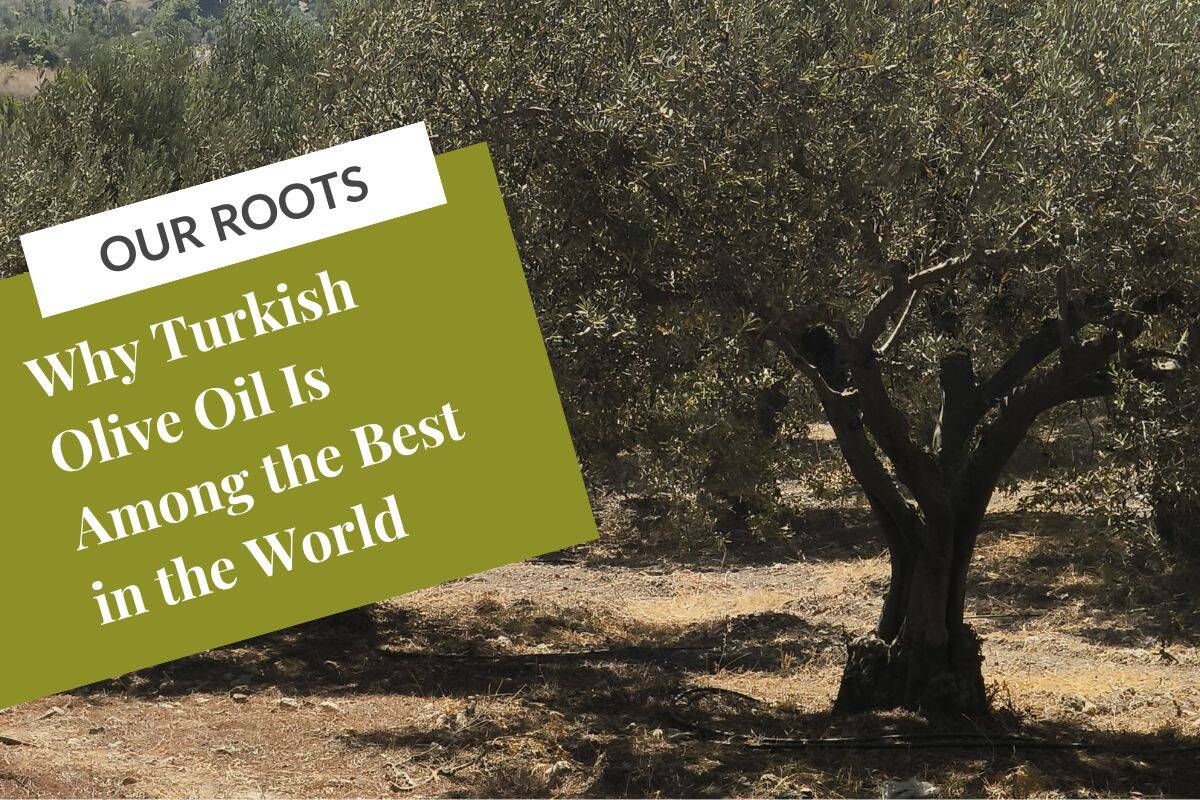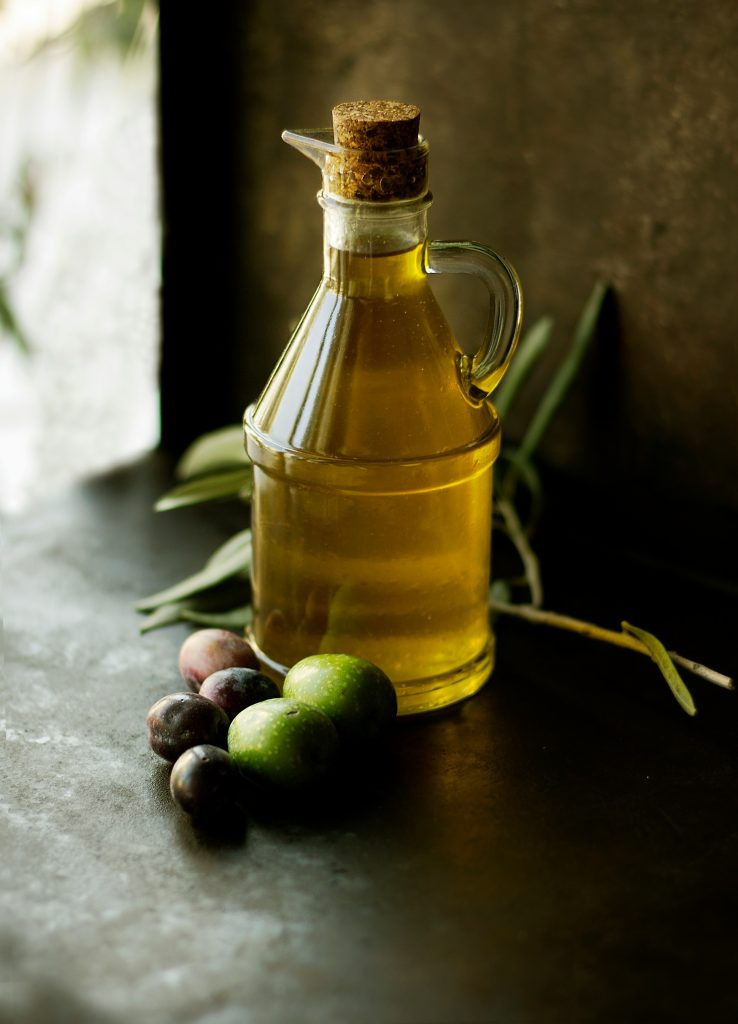
When people think of premium olive oil, their minds often go straight to Italy or Spain. But there’s a quiet powerhouse in the Mediterranean that has been producing some of the richest oils for thousands of years—Türkiye.
I moved to Istanbul in 2019, just 6 months before the pandemic that changed so many lives. I didn’t know anything about olive oil when I got here, but yavaş yavaş (Turkish for ‘slowly, slowly’) I started to notice the differences.
Then my dear friend, who owns Jennifer’s Hamam, introduced me to the olive oil she produces. It was so good I swore I could just drink it. I started to learn more about the differences and the fact that all olive oil is, in fact, not the same.
Despite its deep legacy and outstanding quality, Turkish olive oil is still under the radar, and we are here to change that!
Here’s why we believe it’s one of the best-kept secrets in the olive oil world.
6 Reasons Turkish Olive oil is better
1. Ideal Terroir: Climate, Soil, and Altitude
First of all, terroir, for those of you like me who hadn’t heard it before, is a French word that refers to the combination of environmental factors that affect a crop’s characteristics. This includes things like the soil composition, climate, topography, and even local traditions that contribute to the unique qualities of a product. Essentially, terroir is the “taste of the area”.
It is typically used with regard to wine, though it is making its way into the olive oil conversation because of how much these factors truly impact the flavor of the oil
Türkiye’s Aegean and Mediterranean coasts enjoy the perfect combination of hot, dry summers and mild, rainy winters. Add mineral-rich soil and sea-swept breezes, and you get ideal growing conditions for olive trees.
Obviously, different parts of Turkey have different climates, soils, and even altitudes, and yet it is the perfect place to produce oil that will blow your mind. This climate naturally enhances flavor complexity and boosts polyphenol levels, resulting in oils that are not only delicious but also highly beneficial for health.

2. Millennia of Olive Heritage
Olive cultivation in this region goes back over 4,000 years. Türkiye is home to some of the oldest olive trees on Earth, and the Turkish word for “oil” (yağ, which can also be translated to “fat”) was often understood to mean olive oil. That legacy still lives on today.
With ancient practices passed down through generations, Turkish olive oil benefits from:
- Time-honored cultivation methods
- Unique heirloom varieties like Ayvalık, Memecik, and Gemlik
- A cultural reverence for purity, simplicity, and integrity
3. Naturally High in Polyphenols and Low in Acidity
Turkish olive oil—especially early-harvest, cold-pressed varieties—is naturally rich in antioxidants and flavor compounds. Many oils boast:
- Extremely low free fatty acid levels (sometimes as low as 0.2%, far below the 0.8% maximum for extra virgin)
- High polyphenol content, which contributes to the oil’s peppery notes and potent health benefits
This means longer shelf life, better cooking stability, and more robust support for heart and cellular health.
If you’re looking for a milder, buttery flavor, they are also here! My friend, whom I mentioned earlier, her oil is 0.2% FFA levels and tastes like a dream!
4. Family-Farmed and Minimally Processed
While mass-market brands often rely on blending and refining, Türkiye’s finest oils still come from small family farms that do things the old way:
- Olives are hand-harvested at peak ripeness
- Oils are cold-pressed within hours of picking
- There’s a direct connection between the farmer and the final product
The result? Authentic, traceable olive oil that tastes like it came straight from the grove—because it did.
We partner with small farms and villages across Türkiye that wouldn’t otherwise be able to export their olive oil to the U.S. By sourcing smaller batches from many producers, we’re able to bring you the rich, authentic flavors of Turkish olive oil that are direct from the groves to your table.
5. Undervalued and Underrecognized
Despite its excellence, Turkish olive oil hasn’t yet taken center stage in global markets. Why?
- Lack of global marketing and branding efforts
- Limited export infrastructure compared to Italy or Spain
- Historical practice of exporting bulk oil to Europe, where it was often rebottled as “Italian” or “Spanish”
I was at Costco with my parents recently when they asked for help picking out an olive oil. I showed them where to check the label, and there it was—Turkey listed as one of the sources in the blend.
In other words, many consumers have already tasted Turkish olive oil without even realizing it.
We’re here to help make Türkiye known and recognized for its high-quality extra virgin olive oil.
6. A Hidden Gem on the Rise
That’s beginning to change.
Today, more Turkish producers are pursuing:
- International certifications like IOC and USDA Organic
- Recognition in global competitions, such as NYIOOC and Olive Japan
- Elegant, transparent packaging that honors origin and quality
The world is starting to notice. And Elysian Olive Co. is proud to be part of that movement.

General Health Benefits of Olive Oil
Absolutely — here is an expanded explanation of each general health benefit of extra virgin olive oil (EVOO), with clear, digestible detail and citations for credibility. This format is perfect for educational blog posts, product pages, or wellness guides:
1. Rich in Heart-Healthy Monounsaturated Fats
Extra virgin olive oil is about 73% oleic acid, a type of monounsaturated fat. Oleic acid has been widely studied for its role in reducing inflammation and improving heart health.
Diets high in monounsaturated fats, like the Mediterranean diet, have been linked to lower risks of cardiovascular disease, stroke, and high blood pressure. EVOO may also help reduce LDL cholesterol (the “bad” kind) while maintaining HDL cholesterol (the “good” kind).
So much for all that mumbo jumbo from my childhood about “eating fat makes you fatter.”
2. High in Antioxidants
EVOO is not just a source of healthy fat—it’s also rich in antioxidants, especially polyphenols like hydroxytyrosol and oleuropein.
These compounds help protect your cells from oxidative stress, which contributes to aging and the development of chronic diseases such as cancer and heart disease. Antioxidants also enhance the stability of the oil itself, making EVOO a safer choice for moderate-heat cooking.
3. Anti-Inflammatory Properties
One of the standout polyphenols in EVOO is oleocanthal, which has been shown to have anti-inflammatory effects similar to ibuprofen.
Chronic inflammation is a root cause of many diseases, including heart disease, arthritis, type 2 diabetes, and even Alzheimer’s. Incorporating EVOO into your daily routine may help reduce these low-grade, long-term inflammatory processes.
4. Supports Brain Health and May Protect Against Alzheimer’s
EVOO may offer neuroprotective effects thanks to its antioxidant and anti-inflammatory compounds. Research suggests it can help reduce the formation of beta-amyloid plaques in the brain, a key feature of Alzheimer’s disease.
Some studies on both animals and humans have shown improved memory, cognitive function, and learning when EVOO is a regular part of the diet.
5. Improves Cholesterol and Blood Pressure
Extra virgin olive oil increases HDL cholesterol (the “good” cholesterol), which helps remove LDL (the “bad” cholesterol that clogs arteries) from the bloodstream.
Additionally, the polyphenols in EVOO support healthier blood vessel function and may lead to modest but significant reductions in blood pressure.
6. May Aid in Weight Management
Although EVOO is calorie-dense (like all fats), research shows it can support weight management when consumed in moderation. Its high satiety factor means it can help you feel full longer, reducing overeating.
Studies suggest that people who consume olive oil regularly as part of a Mediterranean-style diet are less likely to gain weight over time.
7. Supports Gut Health
EVOO promotes a healthy microbiome by encouraging the growth of beneficial gut bacteria such as Lactobacillus and Bifidobacteria.
It also strengthens the gut lining and has mild antimicrobial effects that can suppress harmful bacteria like H. pylori, which is linked to ulcers and some types of stomach cancer.
In turn, this helps improve nutrient absorption. A balanced gut microbiome contributes to better digestion, immunity, mood, and even weight regulation.
The Bottom Line
Turkish olive oil is a hidden treasure rooted in thousands of years of tradition, grown in a terroir that creates exceptional flavor and health benefits. It’s a product of passion, heritage, and nature coming together to produce something truly special — an olive oil that not only tastes incredible but also supports your health and well-being.
At Elysian Olive Co., we’re proud to bring this story to your table. We’re more than just importers of olive oil. We’re ambassadors for a land, a culture, and a purity that the world deserves to know and savor.
Discover the rich flavors and time-honored quality of Turkish olive oil and join us in celebrating one of the Mediterranean’s best-kept secrets.
Frequently Asked Questions about Olive Oil
What are Turkish olive oil prices?
This can range depending on the quality, polyphenol count, as well as how much you are purchasing at a time. They are competitive for the market.
Is Turkish Olive Oil of good quality?
Yes! Of course, there are fake oils out there, just like anywhere else. But there are many Turkish oils that are good quality oils. Make sure you check for harvest date, polyphenol count, FFA content levels, and the type of bottle. The darker the bottle, the better.
Which countries’ olive oil is the healthiest?
Olive Oil’s degree of healthiness isn’t based on the country but on the number of polyphenols and the level of the free fatty acids. The higher the number of polyphenols and the lower the FFA levels, the healthier the oil.
Which olive oil is considered the highest quality?
EVOO is the best quality olive oil. EVOO just means that the free fatty acid content of no more than 0.8%. An oil with an FFA content of 0.8% is different quality than one that is 0.2%. The lower the number, the higher the quality.
Does olive oil expire?
Yes, it does expire. It doesn’t spoil in the same way as perishable foods. It loses its quality and flavor over time. Unopened olive oil typically lasts 18-24 months from the harvest date, but once opened, it’s best used within 6 months.
